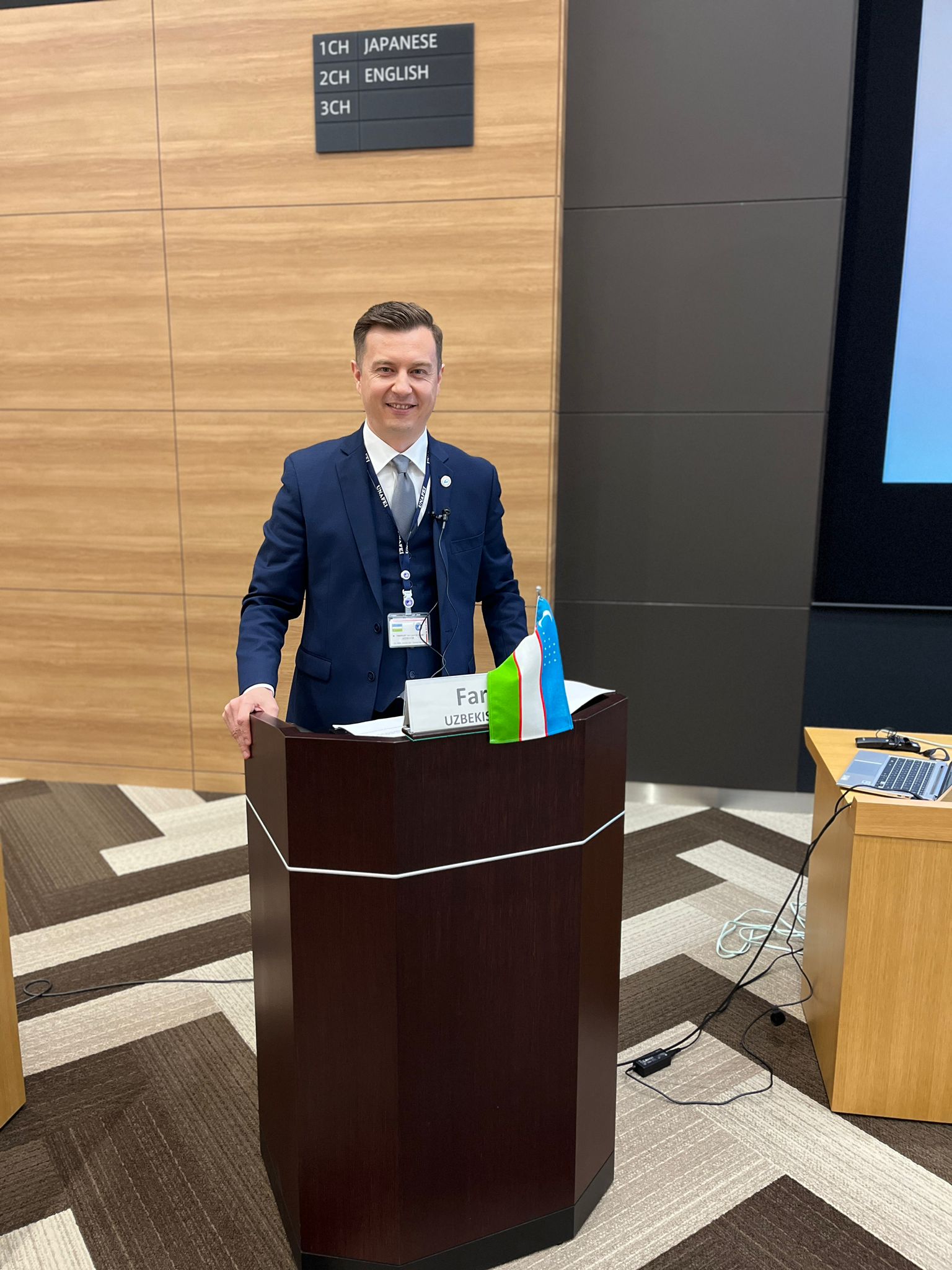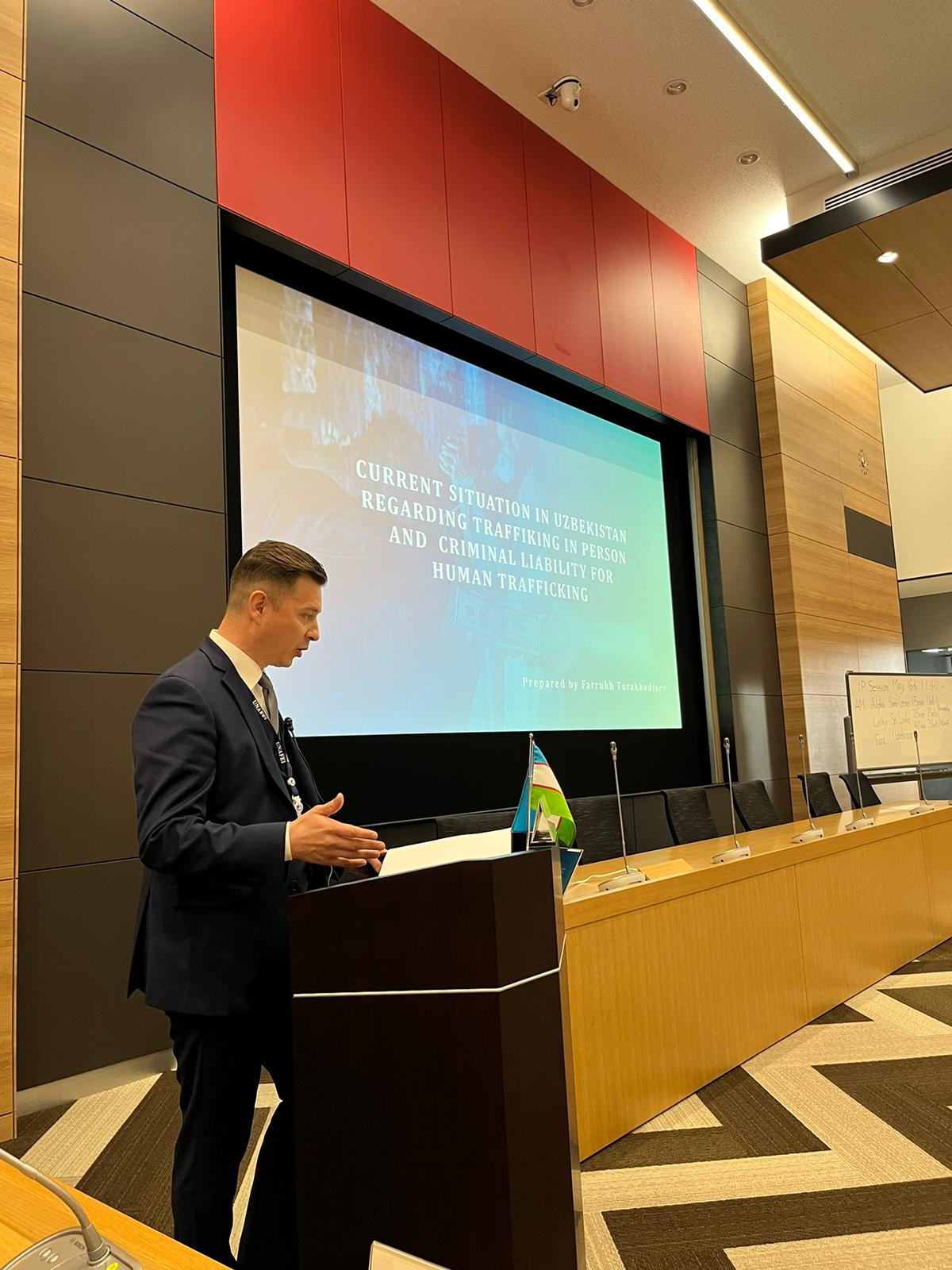[Training] Judicial System Expertise: Mr. Turakhodjaev’s insights from JICA’s training in Japan
2024.09.05
Mr. Farrukh Turakhodjaev, Judge of the Tashkent City Court, shares his experience and thoughts on a short-term training course on criminal justice system organized by JICA in Japan:
“I took part in the training course “Criminal Justice System in Relation to Crimes Related to Human Trafficking” held by JICA in Tokyo for three weeks. Participants from many foreign countries like Brazil, Bhutan, Cambodia, Congo, Ethiopia, Kenya, Maldives, Laos, Sri Lanka, Montenegro, Nepal, Nigeria, Pakistan, Sierra Leone, South Sudan, Thailand, Vietnam, and Japan (total 24 participants from 19 countries) have attended the training course.
The program included lectures, group discussions, practical exercises, individual presentations, special lectures on combating human traffic, support, and interrogation of victims of human trafficking. The main instructor for the training was the United Nations Institute for Crime Prevention for Asia and the Far East (UNAFEI).
During my stay in Japan, in addition to the course work, I became familiar with the judicial system and culture of Japan. In particular, the following practical provisions of the judicial system and culture of Japan seem interesting.
Safe Japan. Japan is a safe country as there are comparatively few fatal accidents. Take, for example, a traffic accident. Road traffic fatalities today are only 3.1 per 100,000 population or 0.4 per 10,000 cars owned. These figures are the best among developed countries.
Punctuality in Japan. In addition to the safety, in Japan, punctuality is one of the mandatory components of people's lives. Train movements, event and conference openings, store openings proceed according to the schedule. The Japanese believe that punctuality increases safety and reliability. For example, if we look at Tokaido Shinkansen train operations in 2023, the average delay was only 0.4 minutes or 24 seconds, under all conditions, including unexpected earthquakes and typhoons.
Furthermore, Tokyo Haneda Airport is recognized as the most punctual (OAG Punctuality League 2016) as well as the cleanest airport in the world. Postal and parcel delivery services are also very punctual.
Japan, the land of honesty. According to the Corruption Perceptions Index compiled by Transparency International, a non-governmental organization affiliated with the United Nation, Japan ranks third along with Germany and the United Kingdom. The reason Japan ranks third is because Japanese officials are endowed with certain powers that are unusual for Japan. In fact, corruption and abuse of power are very rare in Japan.
Japan, where lost things are found. As a result, the number of annual reports of found items exceeds the number of reports of lost items. If an item is lost and not reported, it is more likely that the item will be found and reported. According to the Tokyo Metropolitan Police Department, an average of 73.7 percent of lost funds were recovered by the owner each year. This decency is common in cities and towns across the country.
The Japanese criminal justice system - police, prosecutors, courts, and prisons - is a separate topic worthy of admiration. The police are at the forefront of security. The police adhere to the principle of non-interference in civil matters, preventing conflicts between family members or neighbors unless the conflicts escalate into criminal offenses. Problems related to inheritance or the sale and rental of real estate are resolved by lawyers and, if necessary, resolved in civil proceedings. If a violation of the criminal code is suspected, police officers conduct an investigation. About 30% of suspects are minor offenses (offenders are released after warning), and 70% are referred to the prosecutor's office. Of the latter, indictments are suspended in 56% of cases, and summary indictments (fines) are issued in 23%. Only about 8% go to trial. Between 60,000 and 90,000 offenders are brought before formal courts each year. Among the defendants, those who deny the charges are less than 10%, or about 6 thousand per year. About 3% of defendants who contest charges are found not guilty. A prison sentence without suspension accounts for 40% of trials, while 60% are found guilty but result in a suspension. There are not many police officers, prosecutors and judges in Japan. However, strict but effective measures against drunk driving, crowd control and VIP protection are widely known. This may be facilitated by the Japanese notion that “security values come first.”
Japan is a country with the highest longevity. Japan has the highest life expectancy at birth in the world. In terms of life expectancy, Japanese men and women rank second in the world after Hong Kong.
Women's Association for Rehabilitation Assistance. This is an association of female volunteers who assist local crime prevention, healthy juvenile development, and rehabilitation of ex-offenders and/or juvenile delinquents. There are more than 162 thousand members in 1294 localities. Japan Federation of Big Brothers and Sisters (BBS): Federation of young volunteers who help juvenile delinquents and troubled youth.
Japan is a country with no trouble. In Japan, even the most minor offenses are recorded and therefore crime is under control. The number of offenses under the Criminal Code (theft and other crimes combined, excluding traffic violations) has decreased sharply since 2003. From about 1998 to 2003, the number of such offenses increased significantly, which occurred because police investigations and recording of criminal offenses became more stringent than before. Historically, Japan has been a country of relatively few crimes.
In Japan, not only robberies and assaults, but also thefts are not so common.
Imprisonment rates in Japan. The incarceration rate is at its lowest, with Japan's prison population at around 56,000, according to recent data. This figure corresponds to 44 per 100,000 inhabitants. In Japan, the prison population peaked in 2005 and has been steadily declining since then. Security is one of the most valuable public goods. The Japanese must be endowed with a special ability to maintain public order.
In general, Japan’s experience in the field of criminal justice and existing legal mechanisms seem interesting for further study and application in the judicial practice of Uzbekistan.”



scroll